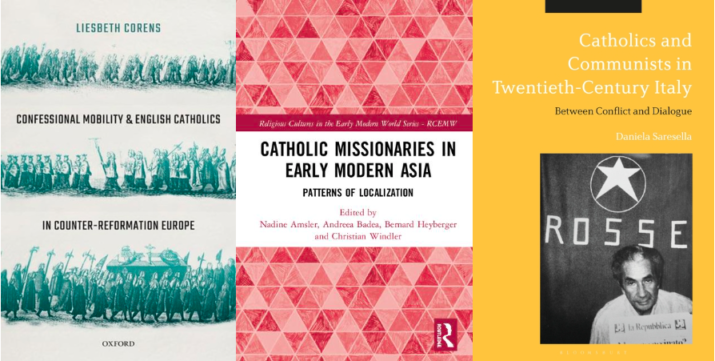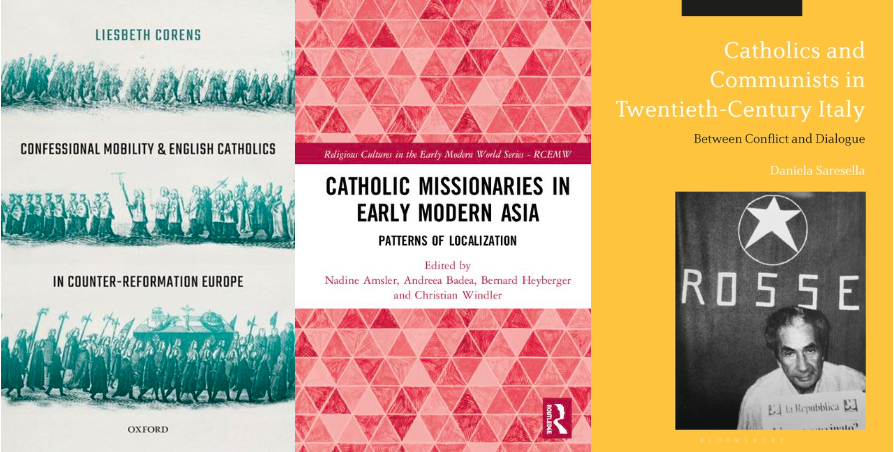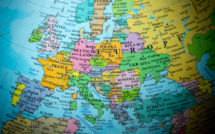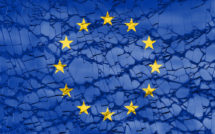

An introduction to our roundtable, Studying Europe Through the Lens of European Catholicism.
This is part of our special feature, Imagining, Thinking, and Teaching Europe.
This roundtable juxtaposes reviews of three recent books―two monographs and one edited volume―that delve into the role of Catholicism in influencing the social history of Europeans and Europe’s place in the world, and challenge the very conceptualization of European Catholicism as a hegemonic monolithic force in Europeanization and globalizing patterns since the seventeenth century. Each volume probes into different time periods and geographies of European development through the lens of Catholicism as a social, political, and cultural influence in constructing a relational Europe: Confessional Mobility and English Catholics in Counter-Reformation Europe covers English Catholics’ movements to continental Europe during the seventeenth and early eighteenth centuries; Catholic Missionaries in Early Modern Asia Patterns of Localization is concerned with the movement of European Catholics to Asia in the same time period up to the nineteenth century; and Catholics and Communists in Twentieth-Century Italy examines societal tensions based on political factions in more recent Italian history. Together, these three books highlight the ways in which European Catholics linked to other places and communities near or far, and the ramifications of these linkages into various aspects of social life―going beyond proselytism―across the world and at home for “communities without borders” abiding by diverse transnational ideologies.
Casting as much light on Catholic communities as on the societies with which Catholics interacted, the volumes at hand discuss the points of contact and the transformations that took place there for all protagonists. The books address Catholic encounters with the Other, whether contacts occurred externally with non-Catholics non-Europeans (in Asia), within European communities (the Left or lay people more generally), or even within Catholic groups themselves (English versus continental European Catholics). This scholarship brings to the fore issues of mobility, transnational exchanges, and materiality, which are intertwined with dynamics of faith, conversion, creative endeavors, education, and cultural adaptation. By demonstrating how these contacts resulted in multimodal transfer, borrowing, change, and collaboration, the books offer different perspectives on the role of Catholics in fostering European societies with layered identities―whether across or within borders―also inferring that it is in this heterogeneity that the study of Catholicism allows for a rich and nuanced engagement with European social history. In revealing Catholicism as an adaptive force in the pull between the local and the global, the three books recontextualize Catholic activists as agents of “glocalization” rather than necessarily as cultural imposition, and highlight that there was as much intra-Catholic unease as there were tensions across religious lines. Resting on different methodologies, the research presented in the three volumes also points to compelling questions about the use of resources, from archival investigation to analysis of material artifacts. The common threads in the books push Europeanists into new directions for further inquiries into religion. Moreover, by bringing those three volumes together in a roundtable in this issue on “European Studies,” we suggest that other “studies,” such as religious studies, play a crucial role in cultivating an interdisciplinary and multi-sited approach to questions of identity and mobility especially relevant in today’s context of national entrenchment in Europe.
-
Confessional Mobility and English Catholics in Counter-Reformation Europe, reviewed by Eilish Gregory
-
Catholic Missionaries in Early Modern Asia Patterns of Localization, reviewed by Michel Chambon
-
Catholics and Communists in Twentieth-Century Italy, reviewed by Natalia Núñez-Bargueño
Hélène B. Ducros is Jean Monnet Chair of Research and Pedagogy at EuropeNow. She is a human geographer with a wide array of interests who has published in various outlets (in English or French) on place-making, landscape perception, heritage preservation, and material culture, including in Norois, the Journal of Sustainable Tourism, Island Studies Journal, The Routledge International Handbook of Walking (2017), Explorations in Place Attachment (Routledge, 2018), and The Routledge Handbook on Place (2020). She also works on issues of teaching and learning and co-chairs the CES pedagogy-focused Critical European Studies Research Network (@CESCritEuro).
Published on June 3, 2020.




